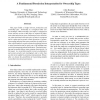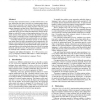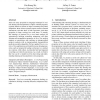55 search results - page 3 / 11 » Ownership types for object encapsulation |
CORR
2002
Springer
13 years 7 months ago
2002
Springer
for data abstraction and justifies reasoning by simulation. Representation independence has been shown for a variety of languages and constructs but not for shared references to mu...
TASE
2008
IEEE
14 years 2 months ago
2008
IEEE
This paper builds a bridge between permissions and ownership types. Ownership is a recognized alias control technique. With ownership, each object is assigned an owner and any acc...
TLDI
2009
ACM
14 years 4 months ago
2009
ACM
For many object-oriented systems, it is often useful to have a runtime architecture that shows networks of communicating objects. But it is hard to statically extract runtime obje...
OOPSLA
2007
Springer
14 years 1 months ago
2007
Springer
There are many proposals for language techniques to control aliasing and encapsulation in object oriented programs, typically based on notions of object ownership and pointer uniq...
ECOOP
2007
Springer
13 years 11 months ago
2007
Springer
Object invariants describe the consistency of object states, and are crucial for reasoning about the correctness of object-oriented programs. However, reasoning about object invari...



